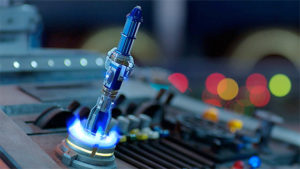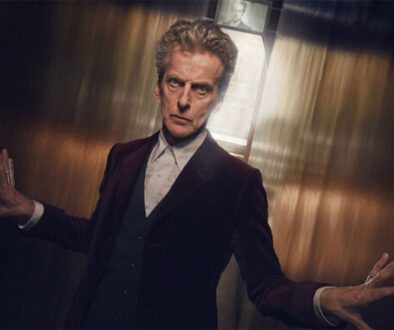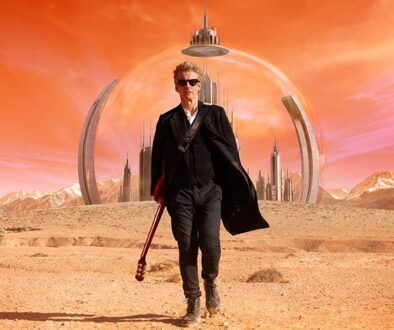Hell Bent Review (Part 2): Questions, Questions
Clint Hassell concludes his review of the Series 9 finale by pondering some questions.

So, Clint, how does it feel to be adored by virtually all of your readers?
It’s surprising, actually. To be honest, I expected to be poorly received when I commented that, because it better reflects Doctor Who’s central themes and Clara’s story arc, “Hell Bent” is a superior exit for Clara over “Face the Raven.” Apparently, that analysis helped a lot of people see “Hell Bent” as more than a tacked-on, trite, “happy ending” for Clara.
Each week, there are always readers who say thanks and offer genuine praise, but this has reached a whole new level.
Lots of commenters said that your review for “Hell Bent” was “your best article ever,” and that “it changed how [they] viewed the episode.”
Well, changing anyone’s mind is never my goal. My job as a critic is to take my background in film, television, and theatre and point out aspects of the series – – good and bad – – that might have been overlooked. My reviews are meant to be less editorial and more analytical.
Fair enough. So, you’ve covered why “Hell Bent” was a fantastic ending for Clara. Was there an aspect of the finale wasn’t as stellar?
“Hell Bent” is incredibly disjointed, because it tries to service two major storylines – – the Doctor overthrowing the Time Lord High Council and Clara’s eventual fate – – one after the other, within an hour. It’s sensible that, this being his first time on Gallifrey, since the end of the Time War, the Doctor would remove Rassilon and the High Council from power – –
The Time War ravaged many worlds, and caused the Doctor to feel the need to regenerate into the War Doctor, his greatest shame.
– – and I’m really impressed that Steven Moffat dedicated time to this important plot point. Had the Doctor not mentioned the Time War, it would have felt out-of-character. Still, the narrative moves away from High Council politics so quickly that there is little time to do much more than hint at the post-Time War state of Gallifreyan society. There’s just enough information for long time fans to piece some events together, but no emotional reward for the casual viewer.
Still, a hint is better than nothing, right?
 Actually, in this instance, a hint is perfect, because the Doctor’s priority was always to save Clara. Dealing with Rassilon was incidental, in the Doctor’s mind, and the narrative reflected that in the amount of time devoted to the matter. It’s actually rather clever. Plus, I rather like that Moffat assumes that the fans are smart enough to remember years-old storylines and characters. There have been so many dangling plot threads, lately, that’ve never been resolved.
Actually, in this instance, a hint is perfect, because the Doctor’s priority was always to save Clara. Dealing with Rassilon was incidental, in the Doctor’s mind, and the narrative reflected that in the amount of time devoted to the matter. It’s actually rather clever. Plus, I rather like that Moffat assumes that the fans are smart enough to remember years-old storylines and characters. There have been so many dangling plot threads, lately, that’ve never been resolved.
The Clara splinters. Orson Pink.
Shona’s “Dave.” How Ashildr protected people from the Doctor.
The remaining Weeping Angel in that New York cemetery.
Madame Kovarian.
The Cyber-Brigadier.
There are several plot points I’m sure we’ll never revisit. Moffat seems to work mostly with storylines from the recent past, which, in fairness – – considering the number of children who watch the series and who may not have even been alive to see Eccleston or Tennant – – is going to be what is most familiar to the viewing audience. It’s nice that “Hell Bent” takes the time to follow up on “The Day of the Doctor.”
So, you were happy to see some mention of the post-Time War Gallifreyan political climate – – and, in fact, wanted to see even more – – but realize that that would have come at the expense of the narrative focus on the Doctor saving Clara, which was more important?
Yes. For example, the Doctor’s foster mother recognizes the Doctor, despite not seeing him in years. I’d love to examine how interpersonal relationships work when the people involved regenerate into new forms, with new personalities, over thousands of years.
Like, was the General’s wife mad when he left for work as a bald, white man and came home a strikingly beautiful, black woman?
 Maybe he, er, “she,” has a husband? After regeneration, the General’s comments indicated that she had always considered herself to be a woman, despite being a man in her last body. Are gender dynamics or sexual orientations even a thing to a Time Lord?
Maybe he, er, “she,” has a husband? After regeneration, the General’s comments indicated that she had always considered herself to be a woman, despite being a man in her last body. Are gender dynamics or sexual orientations even a thing to a Time Lord?
Or, why was Rassilon still in power? Having been drug through an intergalactic war, hidden in another dimension, and then forced into hiding at the end of the universe, you’d think that the Gallifreyan public would have long since overthrown the High Council.
Why did Ohila and the Sisterhood of Karn appear? They seem to be unwanted interlopers, in the first act, but continue to stick around, often speaking with authority.
Exposition? The chance to have a guest star return? Still, considering the Paternoster Gang, and Craig, and River, and Jenny, and Shona, and Journey, and Psi and Saibra, and Canton, and, well, pretty much anyone else, were there really fans clamoring for Ohila to return?
Still, she gets the funniest line: “What’s his plan?” “I think he’s finishing his soup.”
I love that, when asked to “lay down any weapons,” the Doctor drops his spoon, recalling the fight on the log bridge, in “Robot of Sherwood.”
“Hell Bent” actually had a lot of references to previous episodes.
 Of course, this being Clara’s exit, there were several call backs to her previous storylines. There’s one last scene where Clara faces a Dalek (in chains, no less), the Doctor’s “duty of care,” the “Clara who?” line, the conversation via chalkboard messages, and a bit where she quotes the Third Doctor’s catchphrase, hinting at her “impossible girl” past.
Of course, this being Clara’s exit, there were several call backs to her previous storylines. There’s one last scene where Clara faces a Dalek (in chains, no less), the Doctor’s “duty of care,” the “Clara who?” line, the conversation via chalkboard messages, and a bit where she quotes the Third Doctor’s catchphrase, hinting at her “impossible girl” past.
However, it goes further than that. The President’s remark, “Words are his weapons. When did they stop being ours?” serves as a counterpoint to the Doctor’s epic speech from “The Zygon Inversion.” There are obvious references to Ten hating pears and Eleven hating endings, the “four knocks” from The End of Time, and Donna Noble’s tragic fate, as well as subtle nods to the “Time Lord Victorious” and the Teselecta.
But, really, it all pales in comparison to the joy of seeing Twelve and Clara in the bright, white, Hartnell-era console room of an undisguised TARDIS.
The droning hum! The sound that the doors made, when they opened!
And in high-definition, too. Definitely on my list of all-time favorite Doctor Who moments.
The Doctor Who theme was used as a leitmotif, too.
The first time we hear a variant of the main theme, the Doctor has just returned to the barn where Clara frightened and then inspired One, which “Listen” reveals to be the catalyst for the series’ entire 52-year history. The main theme is heard a second time, after the soldiers lay down their weapons, and side with the Doctor – – a move that reinforces Doctor Who’s central theme against violence. The leitmotif recurs in both instances as if to say “This is who the Doctor is,” re-positing the titular question as a statement.
Instead of “Doctor who?” it’s “Doctor who.” That’s deep. You’re quite full of praise, this week! Was there any part of the episode that you didn’t love?
Actually, yes, I’ve one minor quibble, mostly because it’s a science fact that the series has gotten correct, in the past, and that could’ve been easily checked.
The bit about the universe being on the edge of destruction after only 4.5 billion years?
 That’d be it! In 4.5 billion years, even our sun will still be burning. The series has always portrayed the end of the Stelliferous Age as being the “end of the universe.” At this point, the formation of new stars will cease, and the remaining ones will die out, until only white dwarfs and black holes remain, leaving little for the Time Lords to explore. This will happen in about 100 trillion years – – which, incidentally, is the year mentioned in both “Utopia” and “Listen.” Ashildr’s line that she’s “been watching stars die” indicates that she’s at the end of the Stelliferous Age.
That’d be it! In 4.5 billion years, even our sun will still be burning. The series has always portrayed the end of the Stelliferous Age as being the “end of the universe.” At this point, the formation of new stars will cease, and the remaining ones will die out, until only white dwarfs and black holes remain, leaving little for the Time Lords to explore. This will happen in about 100 trillion years – – which, incidentally, is the year mentioned in both “Utopia” and “Listen.” Ashildr’s line that she’s “been watching stars die” indicates that she’s at the end of the Stelliferous Age.
You. Are. Such. A. Nerd! Maybe time just flowed differently within the confession dial than it did in the real world?
Entirely possible, except that part of the plot of “Heaven Sent” is dependent upon the Doctor seeing how the stars outside of the dial are “7,000” to “two billion years” out of place, not 100 trillion. If you have to rely on supposition and invented reasons to justify an error, then it’s no longer just an error – – it’s poor scriptwriting. However, since the series has consistently portrayed the “end of the universe” in this manner, with only the year differing here, I’m choosing to assume that this is just a mistake.
Besides, knowing that Ashildr is at the end of the universe sure makes one wonder about the knocks outside of Orson Pink’s time ship, in “Listen,” and that’s kinda delicious.
Wow. Just . . . wow. So, were there any actual plot holes?
 You just had to go there, didn’t you? Were we not just talking about how much the readers liked me, this week?
You just had to go there, didn’t you? Were we not just talking about how much the readers liked me, this week?
But, since you asked . . .
I find it odd that the Doctor sees the face of the waitress to whom he has just been speaking, painted in memoriam, on his TARDIS, and he doesn’t make the connection that he has just encountered Clara. I’m not saying that his repressed memories should have been triggered, as the Gallifreyan technology erased, rather than telepathically suppressed, memories; but, here, he seems rather dim.
Maybe, he did realize, and just chose to not follow her. They both realized that they were not good company for each other.
True, but, not even to say “thank you,” or “goodbye”? Or, maybe for the occasional tea and Jammie Dodger?
Think of Twelve as having entered recovery. Even one adventure with Clara would mess up his sobriety. The episode is revisiting the addiction motif that was part of Clara’s storyline, throughout Series 8, only this time applying it to the Doctor.
I hadn’t thought of that, before! That’s a brilliant observation!
You’re not the only smart one, here, Clint. Anything else?
 It’s a bit of a cheat that we don’t get to hear the important speech that Clara gives the Doctor, in the Cloisters. While the cutaway does set up Clara’s “They’ll all be looking at me” joke, it still feels like something greater was missed. The Doctor did just spend 4.5 billion years punching his way through an unobtainium azbantium wall, and Clara knows this, so it would have been interesting to hear respond to his act of love.
It’s a bit of a cheat that we don’t get to hear the important speech that Clara gives the Doctor, in the Cloisters. While the cutaway does set up Clara’s “They’ll all be looking at me” joke, it still feels like something greater was missed. The Doctor did just spend 4.5 billion years punching his way through an unobtainium azbantium wall, and Clara knows this, so it would have been interesting to hear respond to his act of love.
If you could change one thing about “Hell Bent,” what would it be?
It’s silly . . . but I’d have changed the random guy that awakens the newly-amnesiac Doctor to Danny Pink.
What?! You never really cared for Danny.
 I didn’t, but, as it stands, the random character serves no purpose. Replacing him with Danny Pink both references a large part of Clara’s arc while also leaving open the possibility that, perhaps, she’s rescued him from his death, and that the two are together.
I didn’t, but, as it stands, the random character serves no purpose. Replacing him with Danny Pink both references a large part of Clara’s arc while also leaving open the possibility that, perhaps, she’s rescued him from his death, and that the two are together.
It would resolve the problem of Orson Pink’s lineage, if nothing else.
That being said, I would have scripted it in such a way that the audience would be unsure if it was really Danny, or one of the Doctor’s fading memories. Like I said, it’s silly.
Oh, and I would have had Clara take the Doctor’s sonic glasses.
Lightning round time. How do you feel about the confession dial being described as a “ritual act of purification that allows a Time Lord to face his demons”?
It fits with the name, but that’s in no way like a “last will and testament.” Like, at all.
The new sonic screwdriver?
 Gaudy.
Gaudy.
But, thank God, it’s back.
No, wait – – “Thank gaudy, it’s back.”
That’s terrible. This is why you are single. Best quote?
The Doctor: “Ashildr . . .”
Ashildr: “‘Me.’”
The Doctor: “’Me,’ go to Hell. By my calculations, you’ve got about five minutes.”
One last photo caption for Series 9?








